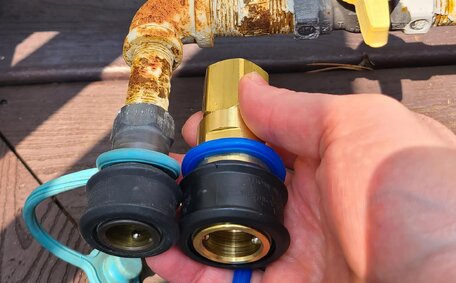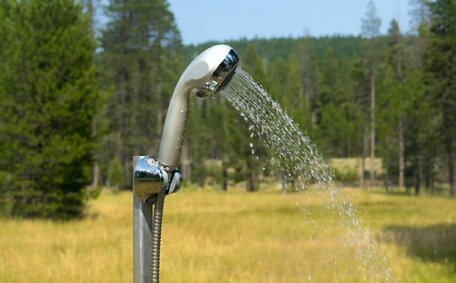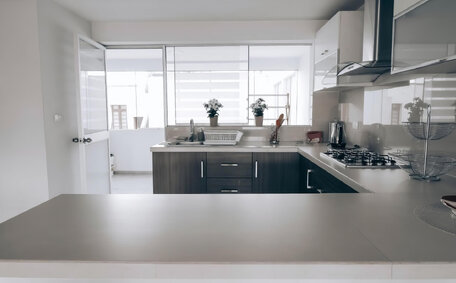Introduction to Off-Grid Hot Water
For households in Gladesville, living off-grid means finding alternative solutions for amenities including hot water supply; installing an off-grid water heater is essential to self-sufficiency.
These water heating systems deliver on-demand hot water, independent of mains electricity or gas. Popular options include solar water heaters, heat pumps, wetback systems paired with wood fires, and propane-powered units. A reliable off-grid solar water supply is achievable with thoughtful planning and technical knowledge, ensuring self-sufficiency.
When selecting the right solar hot water system for your home, Key considerations for selection include initial costs, energy sources, system effectiveness, environmental impact, and the ease of installation and maintenance. Recent advancements allow homeowners to create DIY solar and energy storage systems tailored to their hot water needs.
Assessing Your Off-Grid Hot Water Needs
Choosing the right hot water system begins with an honest assessment of your household’s daily hot water usage.
Consider factors like:
- Number of occupants
- Bathing and showering habits
- Laundry and dishwashing needs
- Peak usage times
Calculate your daily water usage in litres to accurately determine the appropriate size for your hot water system. For instance, solar water heaters usually require 1-2 square metres of panel area per person. Heat pump solar heaters can be sized 20-40% above your highest usage to ensure a continuous supply.
Sydney’s climate also affects these decisions, particularly the efficiency of water heated by each system, with solar thermal efficiency dramatically improving with ample sun exposure.
You can utilise existing wood-fired boilers that complement wood heating, though they necessitate a dry space for storing firewood.
Map your hot water usage patterns over a typical year, the whole process helps in committing to any one off-grid system. This helps balance what’s most practical and affordable while still meeting everyone’s needs.
Solar Water Heating Systems
Solar water heaters are among the most straightforward off-grid hot water solutions. These systems harness sunlight to collect thermal energy for hot water using rooftop solar collectors.
There’s no shortage of options out there, with two main types:
- Flat plate solar collectors
- Evacuated tube solar collectors
Flat plate collectors are simple enclosures with dark absorber plates that trap heat, and water flowing through attached pipes gets heated. Flat plates work well in warmer climates like Sydney.
Evacuated tube systems feature rows of glass tubes, each containing a glass rod connected to a fin. The vacuum between the two glass layers minimises heat loss. While evacuated tubes are the most efficient, they took more roof space than their flat-plate counterparts.
As a rule of thumb, you need about two three square metres of solar collector area per person for adequate residential water heating. A family of four would require 8-12 square metres of panels. Compare costs for flat plate vs evacuated tube systems during planning.
A benefit of solar water heating is its minimal roof space requirement in comparison to solar PV systems. Passive solar heating sidesteps the complexities of electronic systems that can fail, unlike conventional PV systems.
For backup or protracted use, bolster your system with an electric boost heating element and an insulated storage tank, ensuring temperature consistency. Going tankless can work but provides less of a buffer during overcast weather.
Propane/LPG Water Heaters
Propane (LPG) water heaters, when linked to water tanks, offer a viable off-grid solution for hot water. They provide on-demand hot water by burning pressurised gas electric propane. As they don’t rely on electricity or solar energy, propane heaters deliver consistent performance year-round.
Benefits of propane water heaters for off-grid homes include:
- Lower upfront cost than solar water heater systems
- Compact, self-contained units with tank or tankless designs
- Propane’s long shelf life offers supply reliability
- No solar access issues or weather dependence
- Vent safely outdoors, no wood storage needed
- Portable tanks allow flexible setups
- Eco-friendly option when paired with renewable propane sources
For areas with unpredictable solar exposure, propane systems provide a consistent hot water source. Tankless on-demand units connected to compact water tanks work well for properties with limited physical space. Always consult qualified gas fitters during installation for safety and compliance.
While fossil fuels have environmental impacts, propane water heaters provide the best solution as a practical bridge to an off grid lifestyle while renewable energy tech advances. Combining with eco-friendly propane can further reduce your system’s carbon footprint over time.
Heat Pump Water Heaters
Heat pumps offer a way heat water that’s connected to a solar power system, providing an energy-efficient option for off-grid homes. These appliances draw power through a refrigerant cycle to extract heat from ambient air and transfer it to water, effectively utilising the power system.
Heat pumps are remarkably efficient, producing more than four times the heat energy for every unit of electricity consumed. This makes them ideal for living offgrid when paired with a solar photovoltaic (PV) system.
Heat pump water heaters remain efficient in cooler months by extracting heat from outdoor air. Units will continue producing hot water down to air temperatures of about 4-6°C. This allows reliable operation all year round in Gladesville’s climate.
Key factors to consider during the installation of a heat pump system include:
- Ensure your solar system can provide adequate capacity to run the heat pump’s compressor
- Select a unit suited to the number of occupants and daily hot water usage
- Allow proper clearance around the heat pump for airflow
- Install a backup heating element for redundancy during extreme weather or peak loads
While heat pumps are more expensive upfront, their exceptional efficiency pays dividends over time from both financial and sustainability standpoints.
Wood-Fired Wetback Systems
Wood-fired wetback systems offer a cost-effective hot water solution for off-grid homes with existing wood heating setups. They work by channelling water through a coil or heat exchanger built into a wood stove or fireplace.
As firewood burns within your heating system to warm your living space in the winter months, the wetback system captures this waste heat energy to offer gratis water heating. It’s a practical pairing that enhances your wood heater’s efficiency.
Advantages of wood-fired wetback systems encompass:
- Low operating costs by repurposing heat from existing wood supply
- Reliable hot water production overnight and on overcast days
- Long lifespan stainless steel heat exchangers
- Compact, self-contained design
Factors to evaluate when installing a wetback system:
- Professional consultation recommended to properly size and position system
- Routine inspections and maintenance needed to ensure safety and efficiency over time
- Requires dry, pest-free wood storage area
- Supplemental electric or solar heating may be needed in warmer months
With some mindfulness around wood consumption and smoke output, wood-fired systems can be an eco-friendly option over the long term. Schedule annual servicing to keep your wetback performing safely and efficiently.
Maximizing Efficiency With Renewables
Transitioning to off-grid solar energy sources in your home brings significant efficiency enhancements for Gladesville’s hot water systems. Solar panels, heat pumps, and eco-friendly propane can drastically cut your system’s environmental impact and running costs over time.
Coupling solar photovoltaic (PV) systems with an electric heat pump water heater capitalises on free solar energy during sunny periods. Smart controllers shift power usage to daylight hours, with the heat pump’s exceptional efficiency providing ample hot water storage.
This avoids wasting PV energy and eliminates the need for propane or wood fuel backups.
While propane systems are simple to install and use, integrating renewably-sourced bio-propane can reduce your carbon footprint by 60-80% over conventional LPG. Use bio-propane derived from agricultural crop residues to support sustainable farming practices.
For wood-fired wetback systems, responsibly source your firewood from sustainably managed forests or from urban wood waste. Process wildfire prevention thinnings for free firewood that protects habitats while heating your water.
Consider installing solar thermal collector panels on sun-facing roofs to passively capture free heat without complex electronics. Combining solar PV, solar thermal, and heat pumps creates a robust hybrid system maximising efficiency.
Evaluate renewable heat sources like geothermal or air source options too. Every bit of fossil fuel displacement adds up when living sustainably off-grid.
Installing an Off-Grid Hot Water System
Installation of off-grid hot water systems requires careful planning and should be undertaken by skilled professionals like our team at Gladesville Plumbing.
Key steps for installing off-grid hot water systems include:
- Choose the optimal system for your needs and budget
- Select suitable locations for all system components
- Size tanks, piping, and ancillary hardware appropriately
- Secure necessary permits and schedule inspections
- Install system components per manufacturer specifications
- Integrate with existing plumbing lines and power systems
- Pressure test and check for leaks before operation
- Verify proper drainage and ventilation
- Insulate tanks and pipes to maximise efficiency
Our licensed plumbers utilise their expertise to customise your off-grid hot water system to your household’s needs, ensuring compliance with regulations. We stay current on the latest technologies and techniques to build reliable, efficient systems.
Rely on Gladesville Plumbing for sustainable off-grid water heating expertise. Let our team handle your hot water system installation hassle-free.
Maintaining Your Off-Grid Hot Water System
Like any complex system, off-grid hot water setups in Gladesville require periodic maintenance to deliver optimal, safe performance year after year.
Perform at least annual inspections, checking for:
- Leaks, corrosion, or damaged components
- Mineral scale buildup in pipes or tanks
- Correct water pressure and temperature
- Proper drainage and ventilation
- Intact insulation wrapping critical joints
Solar collectors may need surface cleaning and sealant touch-ups over time. Check collector glycol mix ratio if using evacuated tubes prone to freezing. Make sure electric immersion elements remain fully functional.
For propane systems, routinely examine gas lines and burner assemblies for blockages affecting flame quality or heat output. Your qualified gas fitter can adjust as needed.
Wood-fired wetback units require the most vigilance. Annually inspect heat exchangers, clean out ash residue, and confirm the chimney draught strength hasn’t weakened over time. Replace eroded gaskets or seals promptly.
Service maintenance extends system longevity while preventing hazardous mishaps down the track. Trust Gladesville’s plumbers to keep your off-grid hot water system operating safely for years of reliable service.
Budgeting Considerations
In Gladesville, choosing an off-grid hot water system necessitates weighing upfront expenses against potential long-term savings and sustainability.
Solar water heating systems demand a considerable initial investment, typically ranging from $5,000 to $8,000 for a four-person family. However, the zero-cost sunlight and extended system lifespan can save lot on energy bills, hence delivering excellent value.
Propane water heaters are the most affordable initial option, with basic units priced at about $1,500 to $2,000. Ongoing propane fuel costs are moderate and systems typically last 15-20 years.
Heat pumps carry a mid-range $3,000-5,000 price tag but provide the best ROI thanks to exceptional efficiency. Durability exceeds 20+ years with maintenance.
Adding a wetback system contributes to more energy efficiency and can cost between $2,000-4,000. Operation is inexpensive but wood storage is required while heat exchanger lifespan is 10-15 years.
Factoring in appliance longevity balanced with yearly costs gives a fuller budget picture. Our Gladesville plumbing team provides free consultations to analyse options suiting your household’s budget.






